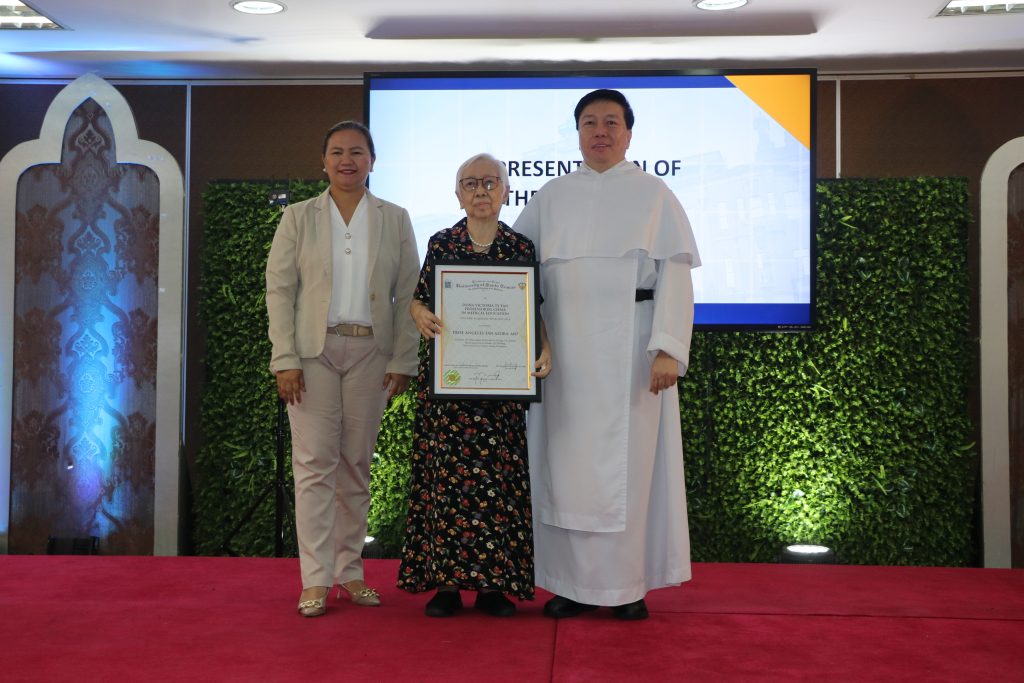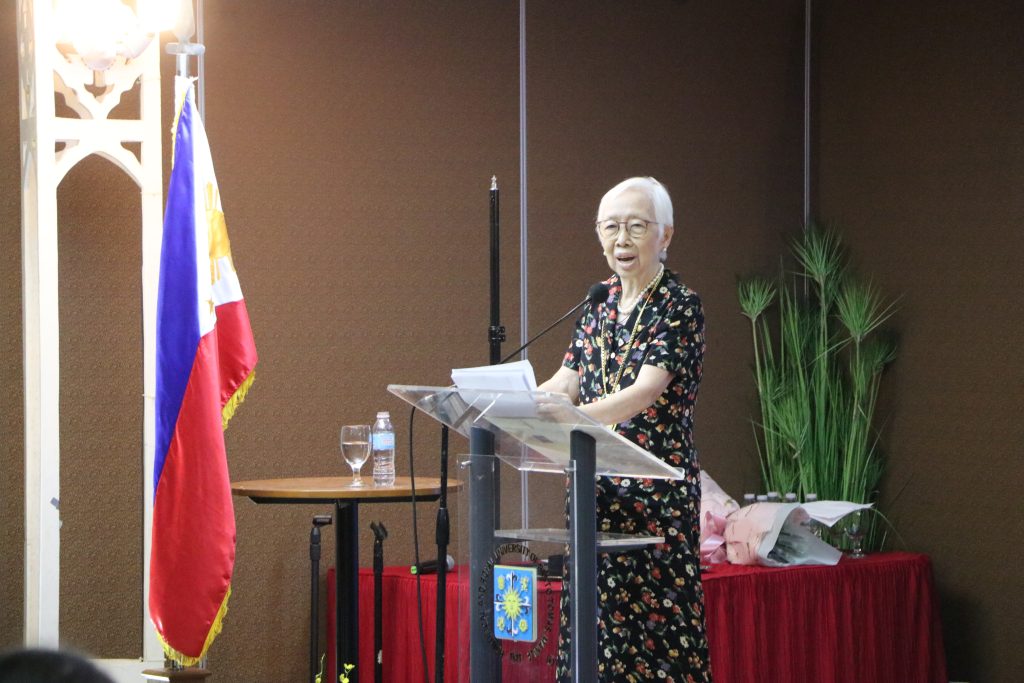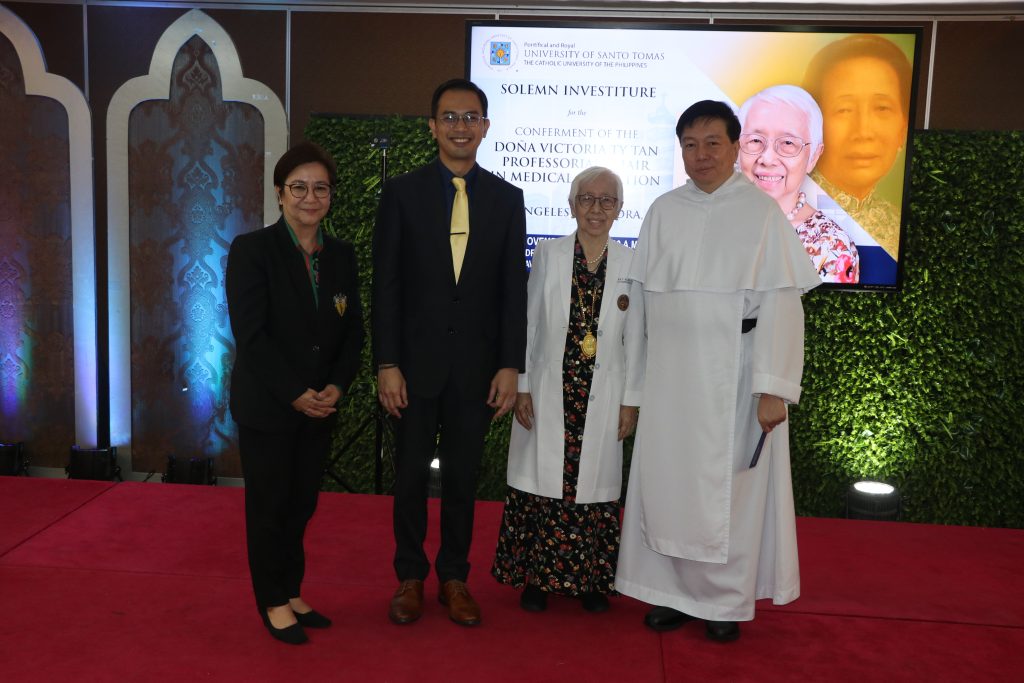Prof. Angeles Tan Alora, M.D., a former Dean and alumna of the University of Santo Tomas Faculty of Medicine and Surgery (FMS), was conferred the Doña Victoria Ty Tan Professorial Chair in a solemn investiture held at the Dr. George SK Ty Hall of the Bl. Buenaventura García Paredes, O.P. Building on November 14, 2023. The professorial chair is named after Doña Victoria Ty Tan, mother of Dr. George S.K. Ty, who founded Metrobank.



UST FMS Dean Dr. Ma. Lourdes D. Maglinao said that the conferment of the Professorial Chair to a foremost specialist in bioethics infectious disease specialist, and trailblazer like Dr. Tan Alora “honors excellence in the field of medical education, celebrates the profound impact of knowledge and mentorship, and explores the insights gained from navigating ethical challenges in these unprecedented times.”
The Dean added, “May this occasion inspire continued dedication and provide lessons to shape a more ethical and resilient future.”
Metrobank Foundation Executive Vice President Mr. Philip Francisco Dy congratulated Dr. Tan Alora on the conferment of the Professorial Chair, which “supports UST in its endeavor to develop programs in medical education and contributes to the global competitiveness of our country’s medical practitioners.”
In her lecture “Enhancing Ethical Behavior: Lessons from the COVID-19 Pandemic”, Dr. Tan Alora shared insights and observations from the ongoing pandemic experience, that she hoped would help healthcare professionals to take actions that lead to “ethical comfort in doing as much good as one can, and achieve what Pope Francis tells us: ‘Be joyful, help without hesitation, and persevere’–to become better persons.”
“There is much beyond our control, and yet much more remains within our control,” emphasized Dr. Tan Alora, who warned listeners that “COVID-19 is here to stay. More will suffer from the disease and its long-term complications. Local spikes and further waves are inevitable.”
Currently beyond control is the knowledge surrounding the disease COVID-19 and the virus that causes it, SARS CoV-2. Said knowledge is incomplete, since it is a “novel illness that continuously evolves daily. There is new information about variants, transmissions, preventive measures, complications, treatments, vaccines, and immunity. We have no truly accurate measure to determine ‘good care’.”
She also remarked on the world’s shift toward internet-based communication and education, particularly the “ubiquitous social media landscape which blurred the distinction between truth and fiction, creating an infodemic of endless opinions, rampant misinformation and disinformation” and the urgency of the pandemic, which “catapulted preprint servers and predatory journals without peer review that lead to a reproducibility crisis.”
The nature and circumstances of healthcare during the onset of the pandemic was also beyond control, such as the vital necessity of strict infection control measures that, at the same time, “threatened personalized, dignified, and humane care.” These include distancing restrictions that prohibit family members to visit or assist patients, leading to those in the ICU dying alone. Due to the scarcity of resources at the time, both human and material, “decisions on how to meet an individual’s need gave way to decisions on how to maximize public care.”
Another challenge was the unprepared public health system stemming from the lack of clear science-based directives and policies during the crisis
A lesson to be learned among these trials, Dr. Tan Alora emphasized, is “Do not give up. Rather, accept with confidence that God’s hand is upon us as we do our part. And what is our part? To focus on what we can control: to be trustworthy, to do the right thing for the right reason, to act virtuously, humbly, compassionately, and courageously,”
An ethical person must summon the courage to do the ordinary tasks in extraordinary manners despite adversity and unpleasant consequences, to act and live with authenticity, integrity, and transparency, to be willing to do what is right above what is convenient, to do even small things with great love, implored Dr. Tan Alora, who added that “the greater danger is not that our dreams are too lofty that we fail to reach them, but that they are too small and we do. We need to dream high and strive to realize that we are meant for more.”
As society begins to emerge from the pandemic, change is inevitable. People must not go “back to normal” but rather collectively build a “new normal that is better than the one before, with an enhanced ethical behaviour.”
Dr. Tan Alora taught at the UST Faculty of Medicine and Surgery for 44 years and served as the head of the Department of Medical Education.
Aside from her affiliation with the University of Santo Tomas, she is also a fellow of the Philippine College of Physicians and the Philippine Society for Microbiology and Infectious Diseases, the latter of which she served as the first woman president. She also taught at UP Manila and became the Director of the National Teacher Training Center for the Health Professions for 5 years.
Dr. Tan Alora is the third recipient of the Doña Victoria Ty Tan Professorial Chair, which started in 2019. She joins the ranks of Dr. Sandra Navarra and Dr. Fidela Moreno. Upon conferment to 10 medical educators and researchers, UST and the Metrobank Foundation will publish a book containing the collated lectures/research works.




